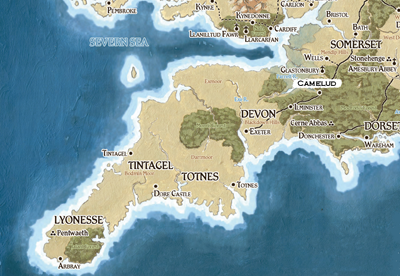The Rules of Play
Our game is played using MetaGaming's elegantly simple The Fantasy Trip campaign rules.
Published in 1980, written by Steve Jackson, The Fantasy Trip is a precussor to GURPS. It uses the 3d6 task resolution roll and is detailed but simple to play.
For those of you interested to learn all you can, I recommend you to the TFT ring of web sites, run by enthusiasts like myself.
For those of you interested only in creating a character and understanding the basic mechanics, read on.
Legends -- extracted from The Fantasy Trip
A Site to download the full rule set -- if you owned the originals
House Rules
While this as a role playing game of swords and sorcery, it is also set in an historic, if somewhat mythic, part of our world. As such, there are certain character types who are more likely to be encountered in such an area. I am open to persuasion about a character role not listed below, but there are certain options that simply not allowed.
No demi-humans. No dwarves, elves, hobbits, fairies, werewolves, vampires, draconic half bloods, orcs, goblins, Sidhe, or other kind of non-human characters are allowed. None.
Likely character types would include:
Noble warriors seeking to join the kings war band
Apprentice wizards seeking to learn magic from Merlin
Common fighters looking for employment in Arthur's forces
Clerics traveling on God's business
Bards hoping to experience the Court of the Round Table and sing songs about it
Road Wardens or Game Wardens with reports from outlying areas
Sharp-eyed or light-fingered adventurers looking for profits
Characters should be young and inexperienced. Just starting out in their careers.
Magic is not common in this world, but it does exist. The following are suggested limits that will help maintain the sense of magic being a fearsome thing rather than an everyday event.
Apprentice Mages should limit their known spells to IQ 10 level spells — they can have the full complement of spells they are eligible to learn, but they are less potent than they might be. There is no reason they cannot learn spells at a higher level during play — but not at the outset.
Bards have access to magic spells, not a easily as a wizard does, but not as hard as a non-wizard, either. They must pay 2 IQ points for each spell they know and they may only know Thrown spells and Creation Spells (except Summon spells) — no Missile or Special spells. They are also limited to IQ 8 — 10 spells at first. They can learn higher level spells in play, but the limits on type continue to apply — though they may learn any spell at the 3 point IQ cost of a non-wizard.
Clerics may come from any religion that is common in this time and place. A Christian Priest or Monk, a Saxon Godi, a Roman initiate of Mithras or a Celtic druid would all be considered clerics.
All clerics have the ability to heal through prayer. This is a spell-like ability that allows the cleric to summon healing energy from the ether. It is process of prayer and ritual. It takes time and it uses up ST points of the cleric — or others willing to join in the process and pray with the cleric. One point of healing can be channeled each hour at a cost of 3 ST to the cleric or others in the circle. The cleric chooses who loses how much ST.
Clerics may also use their holy symbols to Avert the Ungodly. This action does no damage to the target, but miraculous beings cannot approach the cleric closer than a mega-megahex while they hold high their symbol and pray. Avert cost 1 ST per round to maintain.
Road Wardens and Game Wardens are rather like rangers — they can usually hold their own in a fight and they know how to survive in the wilderness.
Fighters can come from almost any background. They may be farmer lads who can wield a quarterstaff, or ex-Roman legionaries experienced with short sword and shield. They might be woodsmen with a long bow, or exiled house carls headed west with long-hafted axes over their shoulders. Long swords are expensive and usually accounted the possession of a noble. Carrying a sword implies a level of grace and responsibility. Applying to be one of Arthur's knights — A Warrior of the Way — is akin to becoming a paladin.
NOTE: Certain weapons do not exist in this time and place: Rapier, cutlass, great sword, heavy crossbow, naginata, pike, boomerang, blow gun, bola, sha-ken, any kind of gunpowder. The same goes for armor. A Roman officer might have a metal cuirass, but other than that, there is no such thing as plate armor. (Sorry – not even for knights.) Pick weapons and armor that fit the character.
Others character types could include Rogues (con-men, thieves, bandits) Merchants, even visiting Dignitaries.
Decide what type of character you would like to play and then we'll work on a character sheet and background that match your desired outcome.
Characters will have 32 + 1d6 points to assign over three abilities: ST, DX, IQ
